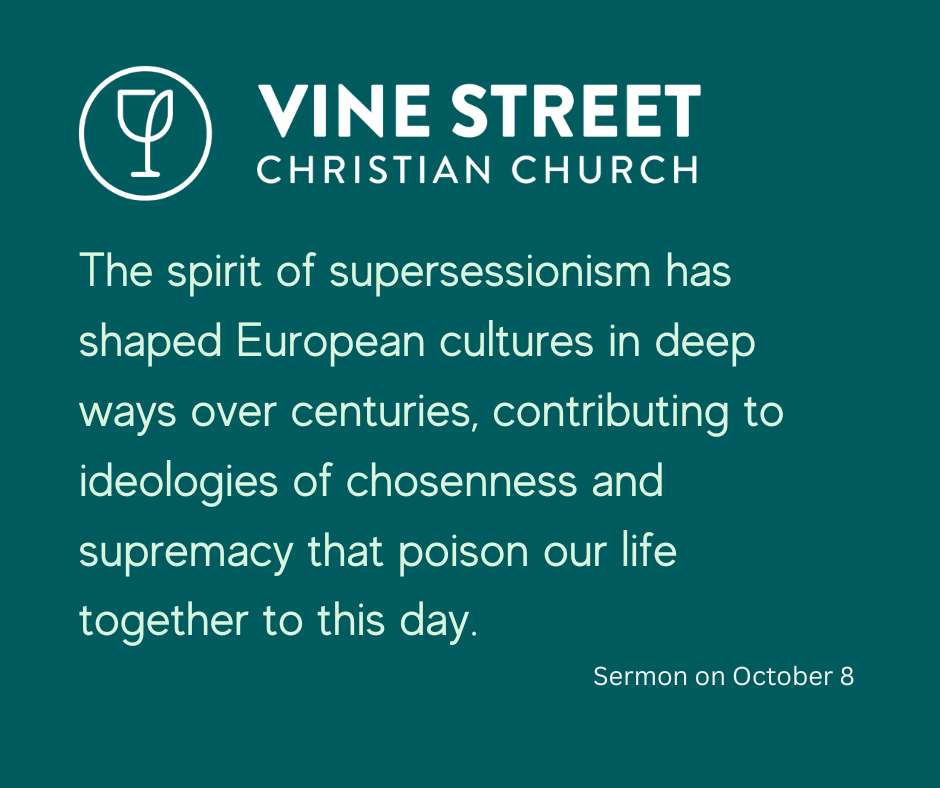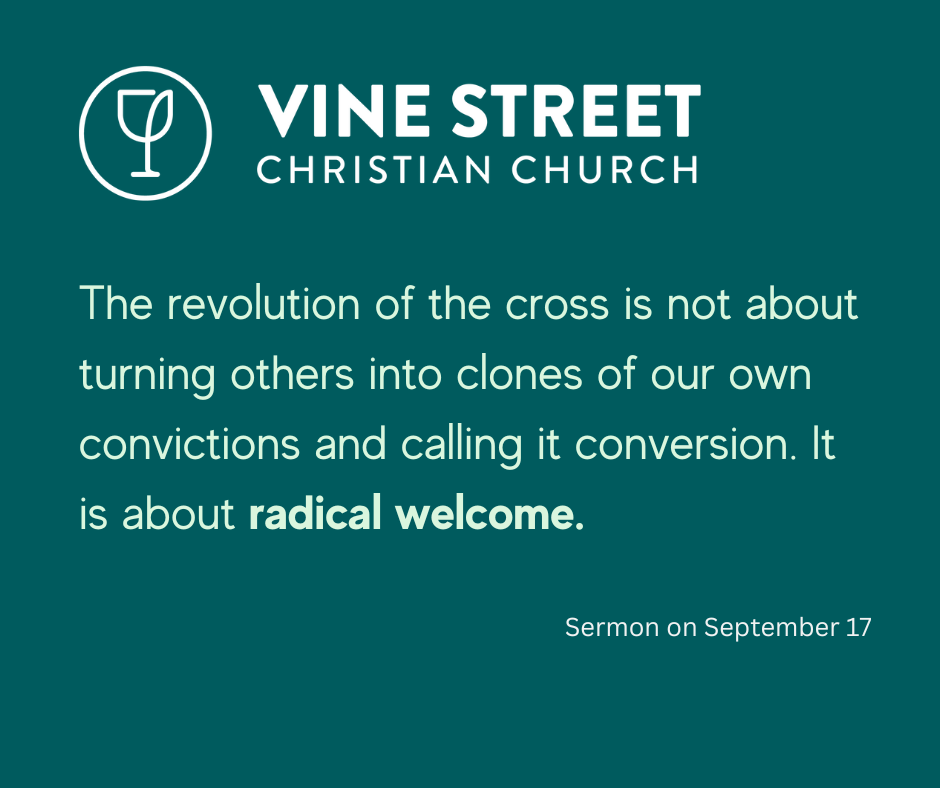Thomas Kleinert
“We know that you are sincere,” they said to Jesus. “We know that you teach the way of God in accordance with truth, and show deference to no one.” How nice of them to say that.
“You teach the way of God in accordance with truth.” That’s quite an endorsement. Had the narrator not warned us at the beginning that we were about to witness a plot designed to entrap Jesus, we might have innocently assumed that they meant what they said. Pharisees and Herodians make odd bedfellows, but stranger things have happened in politics. The name Herodians is shorthand for supporters of the political status quo in first-century Judea, people who, pragmatically or with conviction, collaborated with the Roman rulers. The Pharisees, on the other hand, were not openly opposed to Roman rule like some nationalist groups, but they were certainly not in favor of it. The Roman occupation of the land may not have been their primary concern, but it definitely was not part of their vision for Israel. What brought the two groups together in this scene, was Jesus and his teachings about the kingdom of God.
Matthew paints a picture of Jesus facing broad opposition. Pious Pharisees and hardball Herodians put aside their significant differences for a moment, and they set up a clever trap. First they buttered him up, and then they dropped the verbal equivalent of a landmine: “Is it lawful to pay taxes to the emperor, or not?” Say yes, and it blows up. Say no, and it blows up.
Judea was a province of the Roman Empire, had been since the year 6 CE, and the population was heavily taxed. Estimates range between ca. 20-50 percent of peasant and artisan production was removed through taxes, a significant and damaging amount for those living near subsistence levels.[1] The tax in question was a poll-tax, payable by all subjects of the empire, and in Roman currency. Rome collected it, not for anything like the common good, but to assert its supremacy, and to subjugate, humiliate, and punish the population.[2]
“Is it lawful to pay taxes to the emperor, or not?” If Jesus says, yes, it’s lawful, he loses credibility with the majority of the population, including most of his followers, who deeply resent the occupation. If he says, no, it’s not lawful, he’ll be denounced by his opponents for inciting insurrection and arrested.
It’s a brilliant set-up, only Jesus doesn’t play their game. “Show me the coin used for the tax,” he says, and his opponents don’t seem to have any trouble finding a denarius. Clearly they are much more connected to the imperial economy than Jesus whose pockets are empty.
“Whose image is this, and whose title?” he asks.
“The emperor’s,” they say.
Very likely the coin bore the image of emperor Tiberius, and the inscription was more than just a title. Emperor Tiberius, august son of the divine Augustus, high priest.[3] Text and image declared the emperor’s divine authority, and to most Jews, the coin represented a glaring example of gentile idolatry. They probably couldn’t avoid handling it – too much of the economy was under Roman control – but it was an insult, a constant reminder of their subjugation.
Jesus’ opponents were looking for a simple yes or no answer, but he wouldn’t play their simple, either/or game. “Give therefore to the emperor the things that are the emperor’s,” he told them, “and to God the things that are God’s.”
For Jesus and his followers, for all servants of God’s reign, the choice was and is more complicated than simply condoning violent oppression or engaging in outright insurrection. “I am sending you out like sheep into the midst of wolves,” Jesus told us, knowing the difficult choices we would be facing as witnesses to God’s reign on earth, “so be wise as serpents and innocent as doves.”[4] Jesus plays, wise as a serpent and innocent as a dove. He doesn’t solve the dilemma his opponents presented by carving out separate domains of human loyalty, one where God’s in charge, and another where Caesar rules. He doesn’t sketch parallel responsibilities, in parallel dominions, neat and tidy, no, he turns up the light and heightens the contrast and declares the radical nature of God’s claim over against Caesar’s. I hear echoes of Psalm 24, “The earth is the Lord’s and all that is in it.” That coin? It bears Caesar’s name and image, so let him have it; give it back to him. But don’t you forget that the earth does not belong to Caesar, despite Rome’s claims of global dominion that the tax represents.[5] And don’t you forget that you do not belong to Caesar, but to God. Don’t you forget whose image you bear, that you have been made in the image and likeness of God. Give to God what is God’s — your life, your breath, your loyalty. Give to Caesar what it Caesar’s, wise as serpents and innocent as doves, but serve God’s reign on earth — always aware that it is fundamentally at odds with Caesar’s because its currency isn’t coercion and control.
We are made in the image of God, yet we do forget. Richard Spalding writes,
When we look at each other, or in the mirror, we tend to see the inscription that our business with the world has left on us: you are what you look like, what you have, what you wear, what you do, the company you keep. Nevertheless, underneath all those inscriptions is a much deeper mark.[6]
Underneath all those inscriptions that our business with the world has left on us is a much deeper mark. But we forget. We are made in the image of God, but other inscriptions and images continually overwrite our identity as God’s own with layers of falsehood, and sometimes we can’t look past them, or we refuse to look past them, and all we see are the labels. Jew. Palestinian. American. Fat. Muslim. Immigrant. Arab. Black. Trans. Not a person, fearfully and wonderfully made, created in the image of God, but an inscription. An old white man in Illinois goes and stabs a young mother and her child, stabs this 6-year-old child 26 times, because he’s afraid of Palestinians.[7] In Berlin, a synagogue is firebombed, because, don’t you know it, it’s all the Jews’ fault.[8] Ancient inscriptions. Layers of falsehood. Violent denials of any stories but mine.
Jesus says, Give to Caesar what it Caesar’s, wise as serpents and innocent as doves, and serve God’s reign on earth — always aware that it is fundamentally at odds with Caesar’s because its currency isn’t coercion or fear. Serve God’s reign, give to God the things that are God’s, and let that claim put all other demands made on you in perspective.
As part of every baptism, not just here at Vine Street, just after the person desiring to be baptized emerges from the water, we make the sign of the cross on their forehead, we speak their name and say, “Child of God, you have been sealed by the Holy Spirit in baptism, and marked as Christ’s own forever.” In baptism, the life of Christ becomes ours. We become citizens of the kingdom of God, and with Christ we give to God the things that are God’s — our life, our breath, our days and nights, our whole and broken selves. In the company of Jesus, we live, and learn to live, as citizens of God’s dominion, as people who know that we are not our own, nor anyone else’s, but God’s, and that this is the truth not just about us, but about every human being.
Some of you will ask, “Give to Caesar the things that are Caesar’s — what if Caesar is Stalin or Hitler or some other wannabe emperor?” When Caesar was Hitler, and Hitler attempted to bring the protestant churches under his control as so-called “German Christians,” a small group within the church in Germany resisted. In a carefully worded statement they declared,
As Jesus Christ is God’s assurance of the forgiveness of all our sins, so, in the same way and with the same seriousness he is also God’s mighty claim upon our whole life. Through him befalls us a joyful deliverance from the godless fetters of this world for a free, grateful service to his creatures.
We reject the false doctrine, as though there were areas of our life in which we would not belong to Jesus Christ, but to other lords — areas in which we would not need justification and sanctification through him.[9]
The Confessing Church was persecuted and driven underground, and its pastors were arrested and sent to concentration camps. The church that counts Dietrich Bonhoeffer among its martyrs was small in numbers, but it faithfully refused to give to other lords the things that were God’s – first and foremost themselves. They were ordinary people who left us a gift that is extraordinary in its simplicity and power: They show us that a life fully at home in the love of God is a life of fearless clarity. Even amid the waves of terror and anxiety which the empires and wannabe emperors of the world so skillfully create and manipulate, love lights a path toward life.
What will topple the false idols? Whatever brings wholeness and healing to fractured communities is a form of resistance to the imperial ethos of domination. Whatever encourages us and others to speak truth and seek justice, to see one another and hear one another out, undermines the imperial logic of invasion and control. That is what we seek to do as servants of God’s reign – wise as serpents and innocent as doves, trusting the love that will not let us go.
[1] Warren Carter, NIBD, Vol. 5, 479.
[2] Warren Carter, Matthew and Empire, 142.
[3] TIBERIUS CAESAR DIVI AUGUSTI FILIUS AUGUSTUS PONTIFEX MAXIMUS; see Eugene Boring, Matthew – Mark, The New Interpreter’s Bible: A Commentary in Twelve Volumes, Vol. 8 (Nashville: Abingdon Press, 1995), 420.
[4] Matthew 10:16
[5] Carter, NIBD, 479.
[6] Richard Spalding, Feasting, Year A, Vol. 4, 192.
[7] https://www.nytimes.com/2023/10/15/us/muslim-boy-stabbed-landlord-chicago.html
[8] https://www.politico.eu/article/germany-chancellor-olaf-scholz-condemn-synagogue-attack-berlin/
[9] http://www.ekd.de/english/barmen_theological_declaration.html




